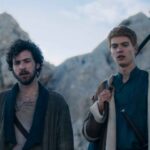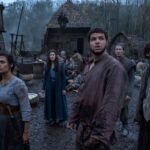Hollywood has no dearth of examples where actors and characters stole the show in their debut appearances when everyone least expected them to. It happened with Ben Affleck as the Batman in Batman v Superman: Dawn of Justice and Heath Ledger’s Joker in The Dark Knight. Closer home, at Marvel, it happened with Robert Downey Jr. in and as Iron Man and both Tom Holland and Chadwick Boseman as Spider-Man and Black Panther respectively in Captain America: Civil War. To a certain extent, the phenomenon was understandable with Spidey given the character’s iconic status. But for someone as unknown as Black Panther to rise to the level of popularity that he did with his debut appearance was a testament to several factors, not least of which was the cultural impact of what it signified. The industry finally had a strong black character in the lead and it was so much more than a stereotype. Anticipation for the Panther’s solo appearance then was understandably high. Critics have already showered enough praise on the movie to instill doubts in rival factions about the veracity of their claims. The big question then naturally on everyone’s minds is: is a Marvel superhero flick deserving of such acclaim? To distill it down to its essence, is Black Panther a great watch?
As promising and significant as the movie’s release is to cinema, it’s plot is more or less generic albeit grounded in some semblance of plausibility for good measure. Instead of being another end-of-the-world scenario then, the story starts off as being more about family dynamics and debates regarding the rightful heir of Wakanda before slowly shifting to a clash of geopolitical ideologies. After a stunning introductory prologue meant to educate the masses on the history and founding of Wakanda, we’re thrust into a flashback sequence in 1992 featuring T’Chaka, T’Challa’s father, as the original Black Panther on an undercover mission to thwart the plans of Prince N’Jobu of Wakanda. This sequence is followed by one in the present day where we see the current Black Panther T’Challa in action, on a mission to extract his ex Nakia from an undercover assignment. Both missions have similar objectives i.e. preventing Wakanda’s exposure to the outside world, a theme that plays out prominently throughout the rest of the film.
The lineage of Wakanda and the Black Panther itself is rich, sprinkled with layers upon layers of detail. The Black Panther mantle, as we’re shown, first originated centuries ago when one of the Wakandans ingested a herb that granted him super-strength and enhanced abilities. The mantle has since been passed on from generation to generation, although to be worthy of wielding it one has to defeat every challenge that is thrown his way by other members of the tribes. This leads to an interesting (and often unintentionally humorous) coronation ceremony where T’Challa is crowned king since the death of his father in the United Nations bombing that took place during the events of Captain America: Civil War. His death was the trigger that drew him into the conflict in that movie and is now the basis for royalty being inferred upon him. Predictably, the leader M’Baku (comic-book villain Man-Ape) of one of the isolationist tribes challenges him to a duel and loses, leaving T’Challa as the new King of Wakanda.
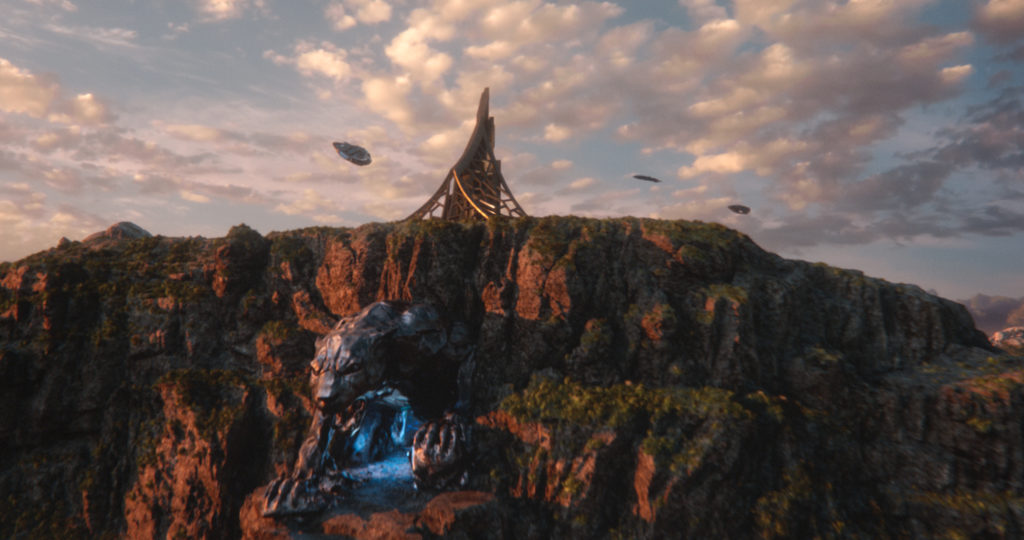 Up until crowning T’Challa as king, director Ryan Coogler keeps things slow, letting us sink into the world of Wakanda. After all, this is the first time since 2014’s Guardians of the Galaxy that an entirely new setting is being introduced in the Marvel Cinematic Universe. Undoubtedly then, the viewers have to be shown a lot to make them understand the concept of Wakanda – a technologically advanced African nation masquerading as a third world country. We’re introduced to the Dora Milaje, the all-female team of warriors led by the fierce Okoye who guard the King and swear allegiance to him at all times. We’re introduced to members of T’Challa’s family including his mother, Queen Ramonda, grieving at the loss of her husband but proud nonetheless of how well her son has stepped up to assume his responsibility and his sister, Shuri, the confident quirky tech wizard that supplies T’Challa’s equipment, their relationship dynamic very much reminiscent of and inspired by Bond and her assistant Q.
Up until crowning T’Challa as king, director Ryan Coogler keeps things slow, letting us sink into the world of Wakanda. After all, this is the first time since 2014’s Guardians of the Galaxy that an entirely new setting is being introduced in the Marvel Cinematic Universe. Undoubtedly then, the viewers have to be shown a lot to make them understand the concept of Wakanda – a technologically advanced African nation masquerading as a third world country. We’re introduced to the Dora Milaje, the all-female team of warriors led by the fierce Okoye who guard the King and swear allegiance to him at all times. We’re introduced to members of T’Challa’s family including his mother, Queen Ramonda, grieving at the loss of her husband but proud nonetheless of how well her son has stepped up to assume his responsibility and his sister, Shuri, the confident quirky tech wizard that supplies T’Challa’s equipment, their relationship dynamic very much reminiscent of and inspired by Bond and her assistant Q.
Some plot spoilers may lurk in the paragraph or two ahead so tread with caution.
The movie picks up steam when a longtime Wakanda foe Ulysses Klaue, is located in South Korea planning to sell stolen Vibranium to a buyer in a Casino. The buyer turns out to be CIA agent Everett Ross played with brilliant subtlety by the excellent Martin Freeman. For those unfamiliar, both these characters were introduced in previous Marvel movies; Klaue had a small part in Avengers: Age of Ultron which is where he lost his arm in a skirmish with the Avengers while Ross had an equally small role in Civil War as the CIA agent working with Ross to get our heroes to sign the Sokovia Accords. Accompanied by Okoye and Nakia, T’Challa decides to take in Klaue leading all our main players to coalesce at the Casino into a great showdown, followed by an equally spectacular car chase along the streets of Busan that’s heavily glimpsed at in the trailers. Klaue ends up in custody but not before long, is broken out by Eric Killmonger.
Killmonger has an interesting history and a past that ties him to Wakanda. Left to live in the city, he joins the Black Ops, raking up kills and scarring his body with marks for each target struck. Yet, behind this insanity lies a man who knows has been wronged by Wakanda in some way and more than swearing revenge, wants to see his ideology of empowering oppressed black people executed. T’Challa knows he isn’t wrong; Wakanda has watched from the shadows for long and it’s about time it got out in the open and offered help to those who need it. It’s only the approach in which T’Challa and Killmonger differ; while the former wants to go the political route and do it the diplomatic way by setting up international embassies and peacekeeping treaties, the latter wishes to go straight to war by putting weapons in the hands of oppressed folk so they can overthrow their rulers and let blacks reign supreme. The two are thus brilliantly contrasted leading to a conflict that’s far more than your standard world ending scenario, which is what elevates Black Panther above the run-of-the-mill epic science fiction flick.
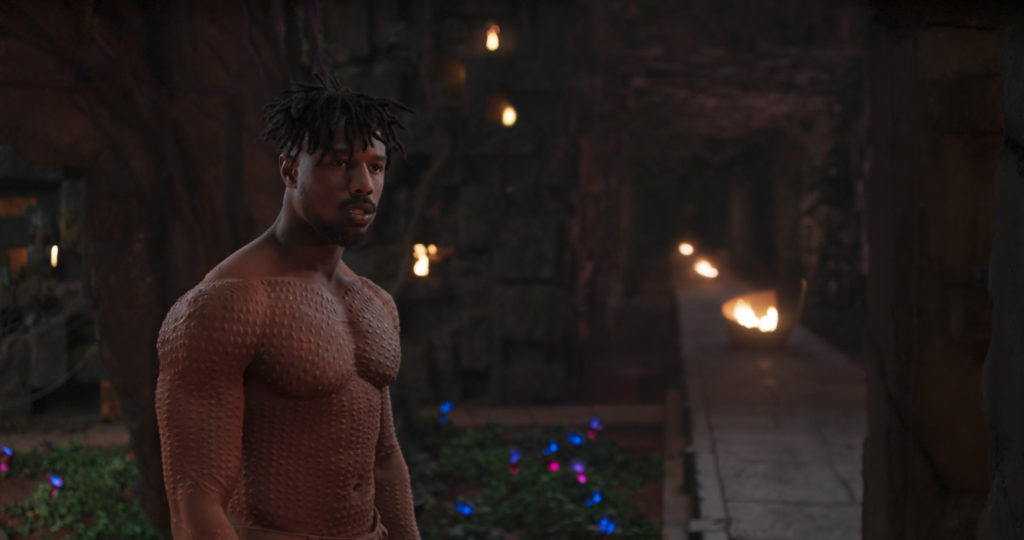 Speaking of the central conflict, one simply can’t deny the brilliant political undertones that this movie has, particularly with the present-day situation in the United States, what with the talk of Refugees and Trump’s stance on immigrants. In an eerie similarity to the States, Wakanda prefers to keep immigrants and refugees out for fear of them spoiling the Wakandan culture. Not all Wakandans are opposed to this; T’Challa’s close friend W’Kabi believes Wakanda should be doing more to help people given the resources it has access to. This misalignment of beliefs between the two is metaphorically synonymous to the divide that has gripped the U.S. on this issue. Trump and T’Challa think on similar lines despite one being far less intelligent and powerful than the other. Does that make them antagonists in their own right? It’s an interesting line the movie toys with and is one of the more currently relevant issues raised throughout the narrative. That a superhero movie manages to bring this up is fascinating to say the least.
Speaking of the central conflict, one simply can’t deny the brilliant political undertones that this movie has, particularly with the present-day situation in the United States, what with the talk of Refugees and Trump’s stance on immigrants. In an eerie similarity to the States, Wakanda prefers to keep immigrants and refugees out for fear of them spoiling the Wakandan culture. Not all Wakandans are opposed to this; T’Challa’s close friend W’Kabi believes Wakanda should be doing more to help people given the resources it has access to. This misalignment of beliefs between the two is metaphorically synonymous to the divide that has gripped the U.S. on this issue. Trump and T’Challa think on similar lines despite one being far less intelligent and powerful than the other. Does that make them antagonists in their own right? It’s an interesting line the movie toys with and is one of the more currently relevant issues raised throughout the narrative. That a superhero movie manages to bring this up is fascinating to say the least.
Wakanda looks gorgeous and several shots and frames stand out, be it T’Challa’s visions with his father, the waterfalls at the coronation ceremony, the snowy mountains and lairs of the Jabari tribe or even the entire underground setup with trains carrying crates of Vibranium at supersonic speeds. Cinematographer Rachel Morrison captures every frame with as much detail as possible. A lot of that detail has to do with the fantastic costume and fabulous production design that together, truly bring Wakanda to life with their rich designs and set-pieces. I wouldn’t be surprised if Ruth Carter takes home the Oscar for her work in costume design, giving each tribe a distinct look inspired by real threads. The writing is crisp and just enough detailed and the tight editing ensures that where other productions squander their run time and meander around, a lot happens in the short 135 minutes that Black Panther runs for. And the action is top-notch with the sequence in Busan being the easy standout, even one-upping the climax. In fact, there’s a moment in the Casino shootout where the actors fight all across the areas as the camera pans on each of them at different corners without any cuts visible to the naked eye, truly giving the viewer a raw sense of all the action unfolding in that space.
The cast really sink their teeth into their respective roles, altering their mannerisms and dialect significantly to sound and look like Wakandans. Leading the pack is Chadwick Boseman whose Xhosi accent reflects a natural authenticity so flawless one almost believes that it’s his natural way of speaking. He owns the role like Downey Jr. did with Iron Man (perhaps even better) and takes his character further in this movie from his debut in Civil War delving into the inner conflict of the kind of king he should strive to be. Danai Gurira has come far from playing Michonne in The Walking Dead, transitioning seamlessly into Okoye carrying over a sense of grace and poise in her moves she picked up on the show. Leticia Wright as Shuri adds spunk to her role and should hopefully inspire a generation of young black girls out there to take up science. Killmonger plays the villain fine enough to not overdo it, although one wishes he had more scenes to add dimension to his character. Lupita Nyong’o is excellent as Nakia, as is Forest Whitaker in his small role as T’Challa’s trusted aide Zuri. Rounding off the cast are the naturally great performances by Andy Serkis as Ulysses Klaue who maintains the madness and maniac quality he brought to this role in Age of Ultron and Martin Freeman as his usual whimsical self in Everett Ross.
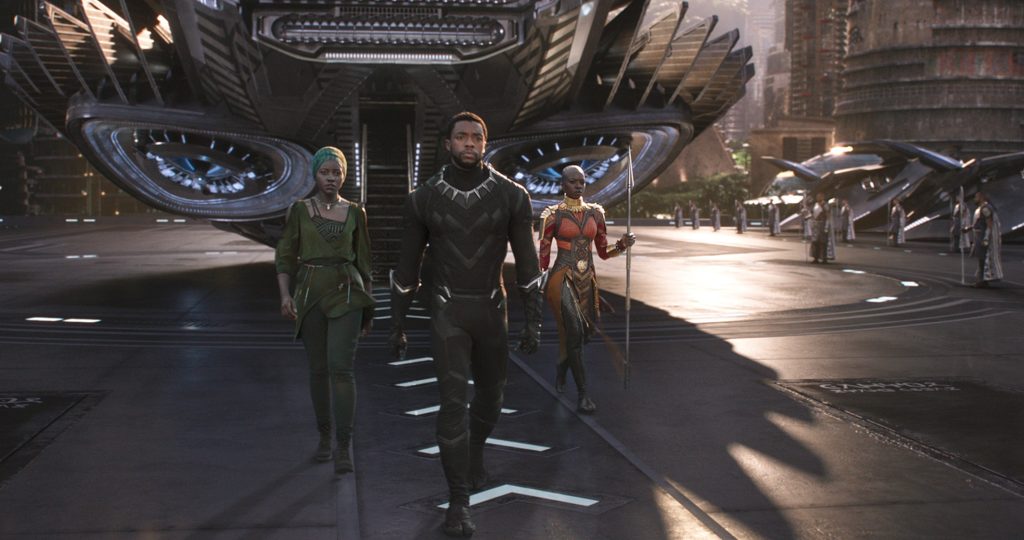 Using this entirely black cast, and a largely black crew, Coogler has crafted a film that an entire generation of moviegoers would be proud of. To gauge its impact, one need not look further than the climactic sequence that sees a group of young kids playing basketball staring in awe at the Wakandan ship that shows up. As the kids stare at the unidentified object in astonishment, another kid looks up to T’Challa asking him “Who are you?”. This short scene signifies the start of a moment that has begun, one where black kids no longer have to rely on white heroes to feed them their dose of inspiration but instead have someone to learn from that resembles their own skin color. For most, this may not mean anything but given the respect with which Coogler’s movie treats its black characters, the movie is sure to fire up the imagination of an entire generation of kids who didn’t have a relatable superhero to grow up with.
Using this entirely black cast, and a largely black crew, Coogler has crafted a film that an entire generation of moviegoers would be proud of. To gauge its impact, one need not look further than the climactic sequence that sees a group of young kids playing basketball staring in awe at the Wakandan ship that shows up. As the kids stare at the unidentified object in astonishment, another kid looks up to T’Challa asking him “Who are you?”. This short scene signifies the start of a moment that has begun, one where black kids no longer have to rely on white heroes to feed them their dose of inspiration but instead have someone to learn from that resembles their own skin color. For most, this may not mean anything but given the respect with which Coogler’s movie treats its black characters, the movie is sure to fire up the imagination of an entire generation of kids who didn’t have a relatable superhero to grow up with.
And even if you’re not black, there’s every reason to catch this movie on the big screen. While it may not be as great or Oscar-worthy as some critics are claiming it to be and has its flaws (the soundtrack for one is pretty much forgettable despite the hype built around it), it’s a great movie in its own right that deserves all the support it can get. And while you’re at it, don’t forget to sit right through the end for a mid-credits and a post-credits scene, both of which are quite important to the overarching MCU narrative than you can imagine.
Overall Score: 8.0 out of 10.0

